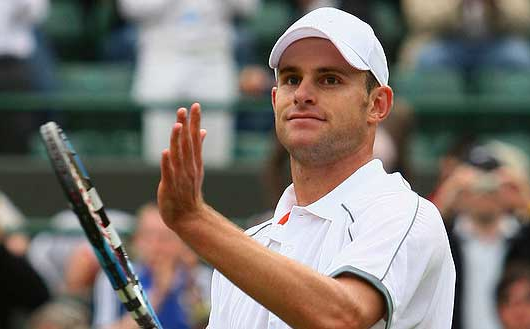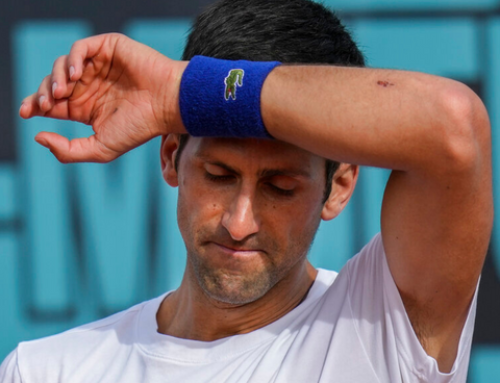3 Things We Learned From Andy Roddick's Career
Andy Roddick announced that the 2012 U.S. Open will be his final tournament as a professional tennis player. His career will come to an end sometime in the next 10 days, but it’s safe to say that his impact on the game will be felt forever. His tenacity, competitiveness and work ethic can serve as a model for all athletes who want to take their game to the next level.
Talent Isn’t Everything
Roddick will be the first to admit that he wasn’t the most talented tennis player or the most gifted athlete on the court. Yet, his résumé proves that he was one of the best ever:
- 2003 U.S. Open Champion
- Three-time Wimbledon finalist (losing to Federer each time)
- Davis Cup Champion
- Ranked in Top 10 from 2003 to 2011
- 32 ATP titles
- 607-209 career record
Roddick may not have had the natural gifts of Roger Federer, Rafael Nadal and other top players; but he still found a way to win. He left everything on the court, and he put in the hard work off the court to compete with—and often beat—the world’s best.
Willingness to Change
Roddick burst onto the tennis scene with a serve unlike any other. He could consistently smash the ball well into the high 130s or 140s, topping out at a blistering 155 mph. (Learn how Roddick hit his blazing serve.) His serve, along with his big forehand, propelled him to the 2003 U.S. Open championship and a world number one ranking. However, opponents quickly found that they could neutralize this weapon if they blocked it back into the court and then attacked his backhand.
Most athletes are content to keep doing what they do well, but not Roddick. He decided to completely reinvent his game to compete better with the all-around players on Tour. He improved his backhand and volleys dramatically and played a more consistent style, less dependant on winners. His willingness to adapt was a major reason Roddick was able to stay at the top for the better part of a decade.
Handling Pressure
Roddick felt enormous pressure to represent American tennis in the tradition of Pete Sampras and Andre Agassi. After the 2003 U.S. Open, it seemed like he would be able to meet people’s high expectations. However, after he lost two consecutive Wimbledon finals to Federer and took early exits from several other tournaments, fans began to wonder whether his game was up to snuff.
Having a few people question your talent is hard enough to deal with, let alone millions. Roddick took the criticism in stride, maintaining confidence in his ability and letting his play on the court speak for itself. The ultimate example of handling pressure came in the 2009 Wimbledon finals, when he held serve for 37 consecutive games. Yes, he eventually lost, but holding that many games against the great Federer in such a high pressure situation was an outstanding achievement in itself.
Roddick’s career will soon end. But his tenacity, competitiveness and never quit attitude will serve as lessons that all athletes can use to improve their performance.
Roddick’s legacy is not confined to his play on the court. Check out the evolution of his style over the years.
Photo: AndyRoddick.com
RECOMMENDED FOR YOU
MOST POPULAR
3 Things We Learned From Andy Roddick's Career
Andy Roddick announced that the 2012 U.S. Open will be his final tournament as a professional tennis player. His career will come to an end sometime in the next 10 days, but it’s safe to say that his impact on the game will be felt forever. His tenacity, competitiveness and work ethic can serve as a model for all athletes who want to take their game to the next level.
Talent Isn’t Everything
Roddick will be the first to admit that he wasn’t the most talented tennis player or the most gifted athlete on the court. Yet, his résumé proves that he was one of the best ever:
- 2003 U.S. Open Champion
- Three-time Wimbledon finalist (losing to Federer each time)
- Davis Cup Champion
- Ranked in Top 10 from 2003 to 2011
- 32 ATP titles
- 607-209 career record
Roddick may not have had the natural gifts of Roger Federer, Rafael Nadal and other top players; but he still found a way to win. He left everything on the court, and he put in the hard work off the court to compete with—and often beat—the world’s best.
Willingness to Change
Roddick burst onto the tennis scene with a serve unlike any other. He could consistently smash the ball well into the high 130s or 140s, topping out at a blistering 155 mph. (Learn how Roddick hit his blazing serve.) His serve, along with his big forehand, propelled him to the 2003 U.S. Open championship and a world number one ranking. However, opponents quickly found that they could neutralize this weapon if they blocked it back into the court and then attacked his backhand.
Most athletes are content to keep doing what they do well, but not Roddick. He decided to completely reinvent his game to compete better with the all-around players on Tour. He improved his backhand and volleys dramatically and played a more consistent style, less dependant on winners. His willingness to adapt was a major reason Roddick was able to stay at the top for the better part of a decade.
Handling Pressure
Roddick felt enormous pressure to represent American tennis in the tradition of Pete Sampras and Andre Agassi. After the 2003 U.S. Open, it seemed like he would be able to meet people’s high expectations. However, after he lost two consecutive Wimbledon finals to Federer and took early exits from several other tournaments, fans began to wonder whether his game was up to snuff.
Having a few people question your talent is hard enough to deal with, let alone millions. Roddick took the criticism in stride, maintaining confidence in his ability and letting his play on the court speak for itself. The ultimate example of handling pressure came in the 2009 Wimbledon finals, when he held serve for 37 consecutive games. Yes, he eventually lost, but holding that many games against the great Federer in such a high pressure situation was an outstanding achievement in itself.
Roddick’s career will soon end. But his tenacity, competitiveness and never quit attitude will serve as lessons that all athletes can use to improve their performance.
Roddick’s legacy is not confined to his play on the court. Check out the evolution of his style over the years.
Photo: AndyRoddick.com












